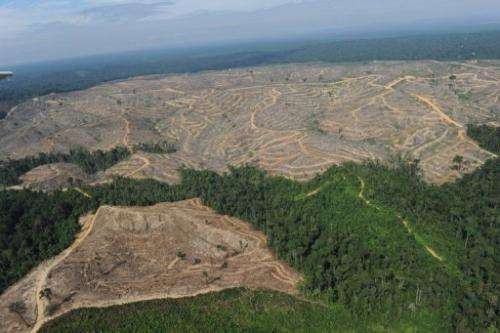Paper giant 'pulping protected Indonesian trees'

Environmental group Greenpeace accused one of the world's biggest paper companies Thursday of illegally logging internationally protected trees on Indonesia's lush Sumatra island.
A year-long undercover investigation by activists on two million hectares of land belonging to Asia Pulp & Paper (APP) in Riau province found that ramin trees classified as vulnerable were being fed to the company's main mill.
"We caught Asia Pulp & Paper red-handed. An investigation shows its main pulp mill is regularly riddled with protected ramin," Greenpeace Southeast Asia forest campaigner Bustar Maitar said.
Greenpeace filmed operations at the company's mill several times over the year and documented ramin timber being pulped alongside other species.
The activists said they took 56 wood samples from the mill to be tested at a laboratory, which found 46 to be protected ramin.
Ramin is the name given to several subspecies of tropical hardwood trees that are found in carbon-rich peatland and swampland in Malaysia and Indonesia.
It is traded primarily to make furniture and items like picture frames and pool cues.
The Indonesian government banned ramin exploitation in 2001 while the Convention on International Trade in Endangered Species (CITES), which regulates the international trade in species threatened through trade, listed it as vulnerable in 2004.
APP said it had launched an internal investigation to verify the veracity of Greenpeace's allegations.
"We take very seriously any evidence of violation of the regulations concerning the protection of endangered tree species. APP will now study the allegations very closely," a statement received by AFP said.
Greenpeace urged companies such as Xerox, Danone and National Geographic to stop using APP's paper in their products.
The environmental group has in recent years waged highly successful campaigns against APP, prompting more than a dozen major international companies, such as Barbie-maker Mattel, KFC and Walmart, to drop paper packaging contracts with APP.
Deforestation accounts for 70 percent of carbon emissions in Indonesia, the world's third-biggest emitter, according to UN data.
The government in May implemented a two-year ban on issuing new permits to clear primary forests and peatland in a carbon-cutting deal backed with $1 billion from Norway.
The country has pledged to cut emissions by 26 percent from 2009 levels -- or 41 percent with international help -- by 2020.
(c) 2012 AFP



















